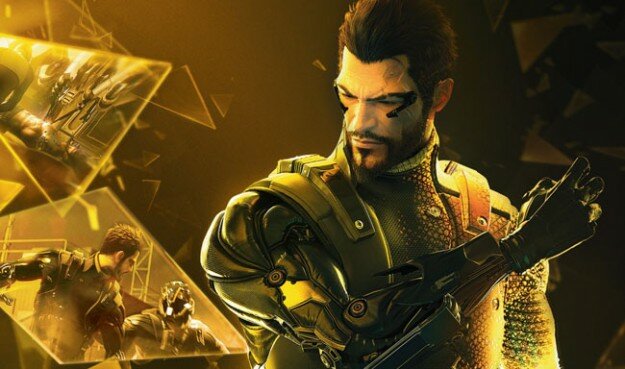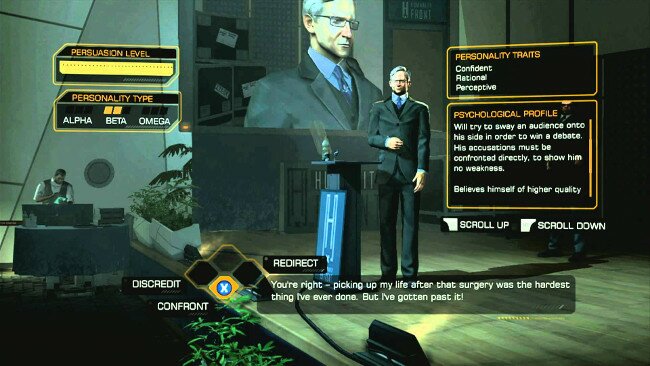
Video Game History: The History of Deus Ex Part 3 (“A Human Revolution”)
In our final part of this Deus Ex retrospective, we take a look the more recent entries in the series, starting off with Deus Ex: Human Revolution. This was the game that for many people, was their introduction to the Deus Ex series, and it was the game that moved the series from a niche cult classic PC game, into a multimedia AAA franchise for Square Enix and Eidos. But was that necessarily a good thing? And what does the future look like for the series? Read on to find out.
Shortly after the release of Invisible War, there was an effort to make a third Deus Ex game, with the two main games being called Deus Ex: Insurrection and another game simply called Deus Ex 3. But after the disappointing performance of Invisible War, these projects were scrapped, and a fourth game intending to release after Deus Ex 3 would be changed to an original game called Project Snowblind. The series wouldn’t surface again until 2007, when development began on a brand new game in the series by the newly formed Eidos Montreal studio, called Deus Ex: Human Revolution. The team was small at the time and consisted of producer David Anfossi, director Jean-François Dugas, senior designer François Lapikas, and art director Jonathan Jacques-Belletête. The first thing they did was play through the first two games to see what worked and what didn’t work, with the intention of staying true to what made the original great. After getting approved by higher ups, the team began working on designs for the game, figuring out what would fit with the game and what wouldn’t, cutting out what was unnecessary.
It was during this point as well that the team also decided that while the game would be coming to most major consoles at the time, the PC version would not be a port of the console versions and vice-versa. As development progressed, the team took inspiration from the mechanics of other games, such as the cover based shooting of Rainbow Six: Vegas, the inventory system of Resident Evil 4, the A.I. from Metal Gear Solid, the hacking from Shadowrun, and the regenerating health of Call of Duty (which drew criticism from fans of the series up until the game’s release). When it came to the game’s scenario, the team took inspiration from the story of the Greek myth of Icarus, the story of the young man who flew with artificial wings but flew too close to the sun and died, to mirror the in-game world’s reliance on experimentation and augmentation, as well as various conspiracy theories, the current level of biotechnology, and non-fiction about transhumaninsm, a movement that believes the best way for society to advance is to enhance the human body with sophisticated technology.Overall though, despite development of the game that was going smoothly, many of the team’s ideas for the game had to be scrapped (real time cutscenes), changed due to time (making the player hit a button to determine an ending), or had to get outsourced to another studio (the boss fights). The game also ran into a slight delay, going from a 2010 release to an April 2011 release.
Finally, on August 23rd, 2011, Deus Ex: Human Revolution was released in North America for the PlayStation 3, Xbox 360, and PC, and published worldwide by Square Enix, who had bought Eidos during development and even helped with some of the game’s cutscenes. Taking place twenty-five years before the original, Human Revolution put players in the role of Adam Jensen, a former Detroit SWAT officer who now works as head of security at Sarif Industries, a leader in the newly created field of human augmentation. When Sarif Industries is attacked by a group of augmented mercenaries called the Tyrants and supposedly kill some of the scientists (including Jensen’s girlfriend Megan Reed), Jensen is saved from the brink of death by his boss David Sarif, who gives Adam the most advanced augments that his company can make. Six months later, Jensen has recovered, and after discovering an augmented hacker trying to steal one of Sarif’s prototype augments during a terrorist attack by an anti-augmentation group, must go on a globetrotting mission that sees him visiting Detroit, Montreal, a recent metropolis in Shanghai called Hengsha, and finally to the Artic to get to the bottom of the attack, its connection to the group that attacked Sarif Industries, and what it all has to do with a secret organization that operates in the shadows called the Illuminati. All this while the world is in a state of flux, as corporations begin to have more influence then various world governments, and riots are going on all over the world as people debate whether augments make us more or less human. Needless to say, there was some pretty heavy stuff going on in Human Revolution.
Much like the original game, Deus Ex: Human Revolution’s gameplay emphasized player choice, not just in terms of unlocking abilities, but also with the game’s mechanics. For example, while Human Revolution wasn’t the first game to have use cover, players could use this cover to take part in traditional shooter combat, or use to sneak past guards and security cameras. Players would earn experience points like in the original, but this time they would be given Praxis Kits after earning enough experience, which could be used to unlock one of Jensen’s augments; what made them interesting however was the fact that they could be gained not just by gaining experience points, but by buying them from NPCs, completing quests, and exploring each area, encouraging players to take their time and not to rush to the next objective. Finally, hacking and talking to NPCs, which were simple prompts in the original, were turned into full fledge gameplay elements, with hacking being turned into a mini game of strategy where you had to pick which nodes to hack and how to proceed without getting locked out, while conversations with some NPCs would play out almost like boss battles, where it was important to pick and say the right thing in order to effectively succeed; heck, there was even a special augment that let you see what these characters were thinking during these events and how they responded to you.
When it was first released, Deus Ex: Human Revolution was well received by critics and players. Many critics loved the story and the gameplay elements, with Eurogamer’s review for instance commending the side quests, as they helped flesh out the world and give players a better understanding to what was going on. However, while it was well received, there were a couple of complaints people had with the game, chief among them being the A.I. on some enemies, the energy system to use augments, a few graphical glitches, and perhaps the biggest complaint of all, the boss fights, which many players and critics felt were too focused on combat and punished players whose version of Jensen was tailored for stealth and hacking. Eidos Montreal would later admit that the boss fights were outsourced to another team, as the focus of the main team was on the game’s story and gameplay. Despite these issues, the game sold almost one million units in its first week, nearly exceeding Invisible War’s lifetime sales, and was nominated for numerous game of the year awards. Shortly after its initial release, the game got its first and only DLC called Deus Ex: The Missing Link, in which Jensen is sent to a research lab in the middle of the ocean. Two years later, on October 23rd, 2013, the game was re-released for the PlayStation 3, Xbox 360, PC, and the Wii U as Deus Ex: Human Revolution-Director’s Cut, which in addition to including developer commentary, incorporated The Missing Link into the main game, redesigned the boss fights so that players who specialized in stealth and hacking had an easier time, refinements to the A.I., and in the case of the Wii U, unique Gamepad functionality, though this functionality was also in the PS3 and 360 versions, the former using the Vita and the latter using SmartGlass.
Thanks to Human Revolution, the Deus Ex series was now a big name franchise for Eidos and publisher Square Enix. Prior to the release of the game, DC comics released a six-part mini-series based on the game that filled in some gaps in the game, and a novel called Deus Ex: The Icarus Effect, which takes place in the same universe as Human Revolution, and follows characters Anna Kelso and Ben Saxon. Two years after the release on Human Revolution, a game based on Icarus Effect called Deus Ex: The Fall was released on iOS and Android devices, with a port coming to PC later; though it had issues, The Fall was still pretty well received by critics, though the PC version was universal panned. On August 18th of this year, a mobile puzzle game based on the Deus Ex series called Deus Ex GO was released as well, and on August 23rd, Deus Ex: Mankind Divided was released for the Xbox One, PlayStation 4, and PC. Much like its prequel, Mankind Divided got a pair of comics called Deus Ex Universe: Children’s Crusade and Dawning Universe, as well as a couple of books: one a full-fledged novel called Deus Ex: Black Light, which follows the events of Human Revolution, and a novella called Deus Ex: Hard Line, and focuses on the Alex Vega, a pilot who Adam Jensen befriends in Mankind Divided. And while plans were ultimately cancelled, there were talks of making an adaption of Deus Ex: Human Revolution, though there have been rumors swirling around that Square Enix would like to make movies on some of its popular IPs, like Deus Ex and Just Cause.
Whenever someone asks about an influential PC game, chances are good that someone will at least mention Deus Ex. Yet despite its inception 16 years ago, the series has only had six games, and of those three, only about a third of them would be considered classics. But despite this, there’s no denying the impact that the games have had on the industry; prior to the release of the original, very few games provided the level of freedom and player choice that the original Deus Ex had, and even to this day, very few games have come close to surpassing Deus Ex’s clever design. And while we can argue about which of its sequels were good and which weren’t, there’s no denying that most of the games had minor victories of their own. For instance, while most of Invisible War’s systems didn’t pan out, the game did excel at giving players more freedom of choice than the previous game (which was saying a lot), and it showed that the team wasn’t afraid to take chances, rather than resting on their laurels. And in an age where many publishers were rebooting their old franchises yet removing what made them great in the first place, Human Revolution was one of the games that proved that not only was it okay to take ideas and concepts from years past and to combine them with modern gaming mechanics, but that players would reward you greatly for it if done right. And as the latest game in the series, Mankind Divided, goes out and is getting great reviews, here’s hoping that the series continues to give players multiple options and tools to use in their fight with crooked governments and uncover shady conspiracies. Which is something that I think we can all ask for.


























